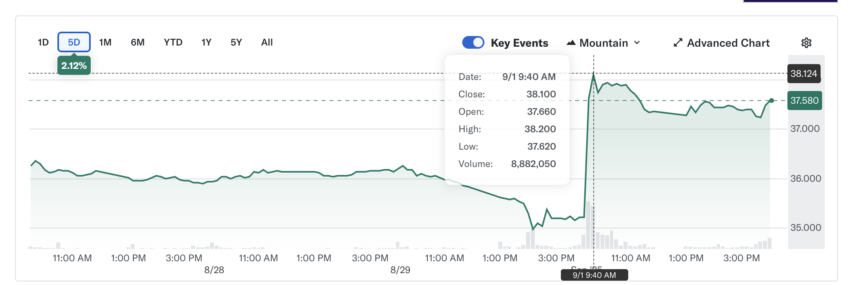Bank of China’s Hong Kong-listed shares jumped 6.7% on Monday to close at HKD 37.580, after local reports suggested the lender’s city unit is preparing to apply for a stablecoin issuer license. The move comes just weeks after Hong Kong rolled out one of the world’s first dedicated licensing frameworks for fiat-referenced stablecoins on August 1.
The development has fueled speculation that one of China’s largest state-owned banks could launch its stablecoin, potentially creating a commercial rival to Beijing’s centrally controlled digital yuan.
Bank of China Moves Toward Stablecoin Application
According to the Hong Kong Economic Journal, the Bank of China (Hong Kong) has set up a dedicated task force to explore stablecoin issuance and prepare application materials. The bank did not respond to requests for comment, but recently told investors it is researching digital asset applications and related risk management.
Market analysts say Bank of China would be among the most significant applicants, given the scale of its operations and the government’s parallel rollout of the digital yuan. Some observers believe a licensed Bank of China token could provide a regulated, internationally accessible counterpart to the central bank’s CBDC.
This news pushed BOC Hong Kong shares up 6.7% to close at HKD 37.580. The stock has risen 50.62% year-to-date, underscoring a strong upward trend in investor confidence. The stock’s historic high remains HKD 40.850, recorded in April 2018, leaving just HKD 3 until a new peak.
Hong Kong’s New Stablecoin Framework and Global Expansion
Hong Kong’s new ordinance requires any entity issuing stablecoins in the city—or those linked to the Hong Kong dollar abroad—to obtain approval from the Hong Kong Monetary Authority (HKMA). Licensed issuers must follow strict reserve management rules, segregate client funds, guarantee redemption at par, and comply with disclosure, audit, and anti-money laundering requirements.
The HKMA began accepting expressions of interest on August 1 and set September 30 as the application deadline. Officials said more than 40 companies, including Standard Chartered, Circle, and Animoca Brands, have already inquired. On August 8, Animoca confirmed a joint venture with Standard Chartered Hong Kong and HKT to pursue the city’s first license.
Chinese tech giants JD.com and Ant Group also announced plans to seek stablecoin licenses abroad. JD.com founder Richard Liu said in June that the company aims to cut cross-border payment costs through stablecoins, starting with business-to-business transfers before expanding to consumers. Vincent Chok, CEO of Hong Kong-based First Digital, highlighted efficiency as a driver.
“Blockchain technology reduces settlement times and bypasses the traditional intermediary fees of banks. The opportunity is especially pronounced in emerging markets where stablecoins hedge against currency volatility.” He added that regulation is accelerating adoption: “The current trajectory suggests exponential growth in the next two to five years.”
Stablecoin Rally Drives Investor Interest in Asia
Investor activity in Hong Kong’s digital asset sector has surged alongside the new licensing regime. In July, listed companies raised about $1.5 billion for stablecoin and blockchain ventures. OSL—one of the city’s largest licensed digital asset platforms—secured $300 million through a share placement supported by sovereign wealth and hedge funds.
A sector index tracking stablecoin-related equities has gained more than 60% this year, far ahead of the Hang Seng. Bank of China’s rally underscores strong appetite but highlights the volatility regulators repeatedly caution against.
However, in mid-August, Hong Kong’s SFC and HKMA warned that sharp market swings tied to licensing rumors may mislead investors, urging vigilance.
Analysts note that Hong Kong’s strict regime could accelerate the rise of non‑USD stablecoins in Asia, providing alternatives to the dollar in regional trade and settlement.
Japan is preparing to approve its first yen-pegged token later this year, while China reportedly explores yuan-backed stablecoins to complement the digital yuan. In South Korea, financial authorities are also studying won-backed stablecoin initiatives.
At this stage, the HKMA has not issued any licenses. Investors are urged to verify issuer credentials through official channels, as regulators maintain that rumors alone will not translate into approvals.
The post Bank of China Shares Surge 6.7% on Stablecoin License Buzz appeared first on BeInCrypto.

 BREAKING
BREAKING  Bank of China (Hong Kong) surged over 7% today after announcing plans to apply for a stablecoin issuer license.
Bank of China (Hong Kong) surged over 7% today after announcing plans to apply for a stablecoin issuer license. 